
Guests
- Mohammad Marandiprofessor of English literature and Orientalism at the University of Tehran who was part of nuclear deal negotiations in 2015.
- Seyed Hossein Mousavianformer spokesperson for Iran in its nuclear negotiations with the EU and visiting research collaborator with Princeton University’s Program on Science and Global Security.
Israel and Iran continue to exchange fire, just days after the United States entered the war by bombing three key nuclear sites in Iran on Saturday. President Trump ordered the attack on the Fordow, Natanz and Isfahan facilities without seeking congressional approval, in a move that could spread further violence across the Middle East. We speak with two Iranian scholars who have taken part in the country’s previous nuclear negotiations. “Iranians see the United States as the aggressor, as helping the Israeli regime slaughter Iranians,” says University of Tehran professor Mohammad Marandi. “There’s anger across the board.” The U.S. and Israeli strikes on Iran are an “obvious” and “clear violation of international law and regulations,” says Seyed Hossein Mousavian, a visiting researcher at Princeton University who served as spokesperson for Iran in its nuclear negotiations with the European Union from 2003 to 2005.
More from this Interview
Transcript
AMY GOODMAN: The United States has joined Israel’s war on Iran by attacking three Iranian nuclear sites over the weekend. U.S. B-2 bombers dropped 14 bunker-buster bombs on Iranian nuclear facilities in Fordow and Natanz. Each bomb weighs 30,000 pounds. They’re the largest non-nuclear bombs in the U.S. arsenal. The U.S. Navy also launched 30 Tomahawk cruise missiles from a submarine at the nuclear site in Isfahan. President Trump ordered the attack without seeking congressional approval. He addressed the nation Saturday night.
PRESIDENT DONALD TRUMP: Tonight, I can report to the world that the strikes were a spectacular military success. Iran’s key nuclear enrichment facilities have been completely and totally obliterated.
AMY GOODMAN: Speaking at a news conference in Istanbul following the U.S. strikes, the Iranian foreign minister, Abbas Araghchi, said the United States would be, quote, “solely and fully responsible,” unquote, for the consequences.
ABBAS ARAGHCHI: Islamic Republic of Iran condemns in the strongest terms the United States’ brutal military aggression against Iran’s peaceful nuclear facilities. It is an outrageous, grave and unprecedented violation of the fundamental principles of the Charter of the United Nations and international law. The warmongering and lawless administration in Washington is solely and fully responsible for the dangerous consequences and far-reaching implications of its act of aggression.
AMY GOODMAN: Following the U.S. bombardment, Israel has carried out new waves of strikes against dozens of targets across Iran, many considered symbols of the Iranian regime. This includes bombing the gates of the notorious Evin Prison, where political prisoners, regime opponents and foreign nationals are held.
While U.S. officials in the Pentagon and Vice President JD Vance has said the U.S. role will not be to pursue regime change in Iran, President Trump’s position is less clear. On Sunday, President Trump wrote online, “It’s not politically correct to use the term, 'Regime Change,' but if the current Iranian Regime is unable to MAKE IRAN GREAT AGAIN, why wouldn’t there be a Regime change??? MIGA!!!” he said — “Make Iran great again.”
For more, we’re joined by guests in Brussels, in London, in Chicago. But we begin in Tehran with Mohammad Marandi, professor of English literature and Orientalism at the University of Tehran, part of the nuclear deal negotiations in 2015.
Professor, welcome back to Democracy Now! Can you explain what’s happening on the ground as we speak, and specifically, over the weekend, the U.S. joining Israel in bombing Iran?
MOHAMMAD MARANDI: People across the country are outraged. And contrary to what the regime in Washington and the regime in Tel Aviv seem to expect, people are rallying around the flag. And they are all saying that this was an unprovoked act of war that the Israeli regime carried out, with U.S. support, as Iran was negotiating, and then, days later, in support of the Israeli regime, the United States carried out its own act of war as the Iranians were continuing to negotiate, and right after negotiations with Britain, France and Germany.
So, Iranians see the United States as the aggressor, as helping the Israeli regime slaughter Iranians. Most Iranians who have died so far are civilians. And today, we’ve seen the regime strike targets in the Iranian capital, civilian targets, killing more people. We’ve had funerals across the country, two 7-year-old children in Tabriz, a city in northwestern Iran, where they had a funeral procession today.
So, there’s anger across the board. And this is going to have huge implications for the future. A generation of young Iranians, who many thought that there could somehow be a deal and rapprochement with the United States, are seeing the different face of Washington and how Democrats and Republicans demonize Iran alongside one another. People in Iran have been passing around images and footage of CNN demonizing Iran, speaking about sleeper cells in the United States, showing that CNN and Fox News are not different at all. They demonize the country. They use the term “regime” to delegitimize and justify aggression against the country. And they try to create a false image of the country in order to prepare the grounds for further aggression. These are things that people are seeing, especially the young and educated Iranians who have greater access to international media.
AMY GOODMAN: Professor Marandi, there are many Iranian dissidents, but thousands of people have taken to the streets to protest the U.S. bombing and the Israeli bombing of Iran. Now Israel has bombed the gates of the notorious Evin Prison, where political prisoners are held. Can you talk about the significance of this and if this has shifted Iranians’ views at all at this point? And also, President Trump doing a 180-degree turn — JD Vance saying, “This is not about regime change. We’re not against Iran. We’re against their nuclear program,” and then President Trump saying, “No, it’s about regime change. MIGA, Make Iran great again.” Talk about the significance of the prison and what this means. Could it divide Iranians?
MOHAMMAD MARANDI: No, because Iranians don’t see the government and the state in a way in which American media and American establishment — the American establishment sees it. Iranians overwhelmingly see the Islamic Republic of Iran as a legitimate state. And now, after the aggression, that has increased.
Evin Prison, the majority of the people there are there because of drug trade. They are linked to the drug trade, and usually they are major figures in the drug trade. You know that in Afghanistan, thanks to the U.S. occupation and the destruction of that country thanks to the United States for over four decades, we have a huge drug problem in Afghanistan, and therefore, a lot of the major figures are in that particular prison. Also, we have ISIS members and al-Qaeda members in that prison. And ISIS and al-Qaeda have been helping the Israeli regime carry out drone strikes inside Iran.
So, I think that is a misreading of the situation in Iran. Ordinary Iranians are looking at the United States as the aggressor, and overwhelmingly, Iranians demand that the government, the armed forces protect the country and punish the aggressor.
AMY GOODMAN: I want to bring into this conversation with you, Mohammad Marandi, Seyed Hossein Mousavian. He is a visiting research collaborator with Princeton University’s Program on Science and Global Security. From 2003 to '05, he served as spokesperson for Iran in its nuclear negotiations with the European Union, author of The Iranian Nuclear Crisis: A Memoir and, most recently, Iran and the United States: An Insider's View on the Failed Past and the Road to Peace. His new op-ed for Middle East Eye headlined “After US attack, Iran could reconsider its nuclear strategy.”
Thanks so much for joining us from Brussels, Ambassador Hossein Mousavian. If you can respond to what the U.S. has done? It’s interesting to have both of you on, because Mohammad Marandi was involved with the Iran deal negotiations in 2015, and you, back a decade before.
SEYED HOSSEIN MOUSAVIAN: It is obvious, Amy, that the U.S. and Israeli strikes on Iran is in a clear violation of international law and regulations. It is a clear violation of United Nations Security — United Nations Charter. It is in a clear violation of the International Atomic Energy Agency rules and regulations. And many experts now are talking that the current attacks are not only attacks on Iran, they are attacks on Non-Proliferation Treaty. It is — it would have definitely a counterproductive result.
I mean, the fact is, Amy, that Israel is the only country in the region with 100 to 400 nuclear bombs, and Iran is member NPT. Israel is not. Iran does not have nuclear bomb. Israel does have nuclear bomb. And Iran has given the highest — the most inspections to the IAEA during the history of IAEA, and Israel has never given such access to IAEA.
And now Iran is the most sanctioned country, and the U.S. is supporting Israel with nuclear bombs. And they both are claiming that they are fighting proliferation in the Middle East. I mean, practically, the U.S. is supporting a country with nuclear bomb attacking a country with no nuclear bomb, claiming that the U.S. is fighting for proliferation in the Middle East. Therefore, Iranians are now looking for key as being member of the Non-Proliferation Treaty, giving every access to the IAEA, and now they have been attacked. Before, they have been sanctioned. And countries like North Korea, Israel, India, Pakistan, which they have never accepted Non-Proliferation Treaty, they have never been attacked. That’s why they are now thinking perhaps having nuclear bomb is much better deterrent compared to being member of NPT.
AMY GOODMAN: I mean, this is an extremely important point you’re making, Ambassador, the issue of whether this would encourage nuclear proliferation, that you have Iran, a non-nuclear nation at this point, being attacked by two nuclear nations, the U.S. and Israel. So, the lesson learned is, you need to be a nuclear bomb-armed nation not to be attacked. For example, the U.S. isn’t attacking North Korea. So, if you can talk about what this means and the idea that you can come up with a military solution to what’s happening in Iran? It now may be well that the nuclear material has been moved from the place that the U.S. bombed, from Fordow. And so, in the end, it’s going to take diplomacy anyway.
SEYED HOSSEIN MOUSAVIAN: First of all, from the day one, when Israelis, they attacked Iran, I publicly said this is not the Israeli strike; Israel has coordinated this military invasion of Iran by the NATO countries, by the U.S., and it is fully supported by NATO, and Iran is confronting NATO, not only Israel. And it is now about 12 days passed. Everybody now understands that the NATO countries, they are fully supporting Israel, and the U.S. also attacked Iran by the demand of Israelis. This is number one.
Number two, if President Trump really wanted a nuclear deal, he could get it easily, because in his first term, he killed the JCPOA, Amy, you remember. JCPOA, the Iran nuclear deal, was agreed between Iran and the U.S. and the world powers. The United Nations Security Council passed the Resolution 2231. The IAEA adopted many resolutions. It was working very well. Iran gave the highest level of access, inspection, transparency measures to the IAEA. Every technical issues with the IAEA was resolved. Even IAEA publicly said, “All possible military dimension issues are resolved.” The deal was working very well. Even beyond the nuclear, Iran and the U.S., they agreed that Iran would buy 100 American passenger planes, the Boeing planes. Even when 16 American sailors, they entered Iranian water territory illegally, Iran released them in less than 48 hours. I mean, everything was going in the right direction, until President Trump withdrew and imposed the most comprehensive sanctions. This is about the first term of President Trump.
In the second term, when he was elected, he actually put an option on the Iranian table: “Deal under my terms and condition, or you will be attacked.” This was not and is not the language of diplomacy. This is the language of threat and bullying. And then, we have Iranian Foreign Minister Araghchi with Steve Witkoff. They had three rounds of talks in Oman and Rome, and they agreed on the principles. I mean, they really agreed. Then they agreed that the technical team would sit, and they would draft it to be signed. Suddenly, Prime Minister Netanyahu called President Trump, and President Trump backed down. And then Israel attacked Iran. When Israel attacked Iran, then President Trump publicly said to Iranians, “Unconditional surrender.” And then the U.S. attacked. And now, after the U.S. attacked, now he’s saying regime change. Therefore, now everybody, I think, has a correct understanding, real understanding, that, unfortunately, President Trump is not really for diplomacy and a solution.
Otherwise, if really they want a solution on the nuclear, it is easy, because we have three major issues. One is about Iran cooperation with the IAEA. We have the model. The model worked for three years very well. Every technical issues were resolved. The nuclear deal, they can agree that all transparency measures, verification measures can be revived based on the deal, and every technical issues can be resolved between Iran and the IAEA. The second issue is about whether Iranian enrichment would be military or civilian. If it is below 5%, definitely would be civilian. Iran is ready to go back to — like the JCPOA, to go back to enrichment below 5%, to stop 20%, to stop 60%. And the third issue is about the Iranian stockpile of enriched 400 kilogram of 60% enriched uranium. I think if there is a comprehensive, fair and balanced deal, Iran would be ready either to export or to dilute this stockpile. Therefore, every concern would be removed. It is really within the reach if President Trump is going to have diplomacy succeed.
AMY GOODMAN: We’ve just spoken with Ambassador Mohammad Marandi in Brussels, who helped to negotiate an Iran nuclear deal back in 2005 — rather, Mohammad Marandi, who is a professor of English literature and Orientalism at the University of Tehran, part of the nuclear deal negotiations in 2015, and we just heard from Ambassador Hossein Mousavian, who was involved in negotiations in 2005.

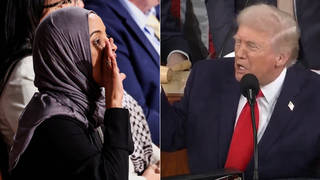
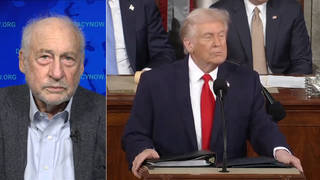
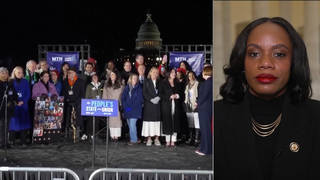
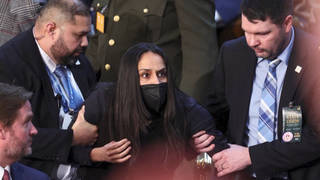





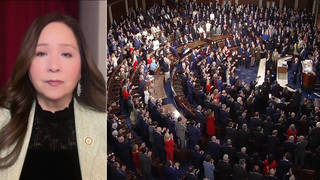
Media Options